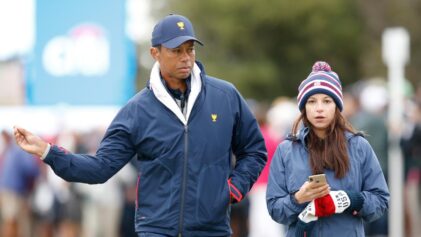Professional golfer Tiger Woods has become among the most polarizing figures in sports over the past 10 years. Once among the untouchables in all of sports, Woods' popularity has plummeted since the details surrounding his divorce due to infidelity in 2010. He lost several key endorsements, and after a brief period of injury and professional mediocrity Woods' professional reputation appeared well on the road to recovery. He wasn't the Tiger of old, just simply, an older Tiger. But he was still better than everyone else, winning five times and named PGA Tour Player of the Year. But this month, things seem to be taking a downswing angle. EA Sports announced that in a mutual decision with Tiger Woods, they’d no longer be releasing Tiger’s PGA Tour Video Games, despite its critically acclaimed run since 1998. And according to Golf channel analyst, Brandel Chamblee, in a column he wrote for SI Plus, Tiger Woods' golfing efforts have earned him an "F.”
How can the best professional golfer in the world earn a failing grade from one of the sport's most reputable Golf news sources? Chamblee believes three instances in which Woods broke PGA rules during the 2013 season. Tiger was disciplined for each instance and earned Player of the Year despite them. Outrageous statements, outlandish behavior, Chamblee's opinion was immediately lambasted by his peers and he would later admit to being somewhat heavy-handed in his grading of Woods via twitter:
''What brought me here was the realization that my comments inflamed an audience on two sides of an issue,'' Chamblee wrote on Twitter. ''Golf is a gentleman's game and I'm not proud of this debate. I want to apologize to Tiger for this incited discourse.”
But it was already too late. His comments were contrarian to such an extreme that he was ultimately made uncomfortable for having said them. And now, Tiger has responded. ''All I am going to say is that I know I am going forward,'' he said to reporters after his exhibition match with Rory Mcilroy at Mission Hills. ''But then, I don't know what the Golf Channel is going to do or not. But then that's up to them. The whole issue has been very disappointing as he didn't really apologize and he sort of reignited the whole situation. 'So the ball really is in the court of the Golf Channel and what they are prepared to do.''
At what point did objectivity cease being the primary goal in reporting? From hard news to sports, color commentating and analysis done live and in writing is as much about entertaining as it is about journalism. Often times the viewpoints displayed by many sports broadcasters are just for shock value. The copy and speech of both sports writers and broadcasters often contains opinion that run contrary to some commonly held sports truths. Even us here at The Shadow League do it regularly. And we tend to like it.
But we’re not alone. For example, look at how the ESPN staff selected SG Kobe Bryant as the 25th best player in the NBA for the upcoming season. Or the way some media outlets are constantly beating the "bring in Tebow" drum despite all indicators to the contrary. Or, up until recently, Philadelphia Eagles fans who believed QB Nick Foles was their signal caller of the future. And when it comes to TV, network commentators are notorious for jumping the shark when speaking on the topics of the day. It's why we tune in to watch some sports talk shows. The average sports fan is saturated with sports news coverage. Networks and newsmen alike have to stand head and shoulders above the competition to be noticed. The pillars of professionalism, honesty objectivity and integrity were what news outlets once used to establish their brand.
However, these attributes almost appear to be optional in the digital age. As these qualities remain affixed to the very bedrock upon which the fourth estate rests, other platforms of notoriety have sprung forward from the static seas of mass media; outlandish claims, outrageous behavior and the rise of chronic contrarians are primary among them. Those who use these talent stilts to artificially standout don't have to be accurate or reasonable. Heck, it would seem that intelligence is negotiable in some instances. Have you ever watched ESPN's Skip Bayless argue the merits of Tim TeBow in one breath? And then speak as if out the back of his neck regarding why LeBron James is the most overrated MVP in the history of the NBA? I can admit that I am not a flag-bearing member of the LBJ brigade, but I have to acknowledge the man is nice. Not just good, not just great, beyond them all lies nice. He is clearly that. Find a journalist whose thoughts are to the contrary and you likely will find one who is willing to feign a contrarian viewpoint whenever it appears to be in his or her best interest to do so.
Being a "hater" is another stilt upon which the lesser practitioner props his abilities. It goes without saying that coverage of the modern professional athlete is akin to being a priest within a cult of personality where many deities are worshipped. But there is a counter view for every affirmative statement to the greatness of any superstar. Yes, professional sports superstars are polarizing figures. The mere mention of a polarizing figure is what drives Nielsen ratings, radio-listens and unique page views alike. Sports are competitive by nature, and it is that very competitive energy that drives coverage, whether positive or negative. People will do across the media spectrum whatever they can to win. But whatever happened to just keeping it 100 and showing both balanced sides of a story? One would think that would be healthier than wearing stilts. The higher you are, the more tragic the fall. And according to Tiger Woods and his agent who hints at legal action, Brandel Chamblee might be next.



